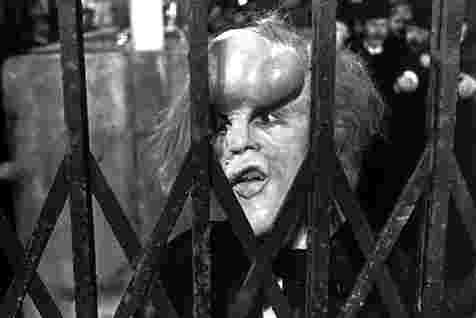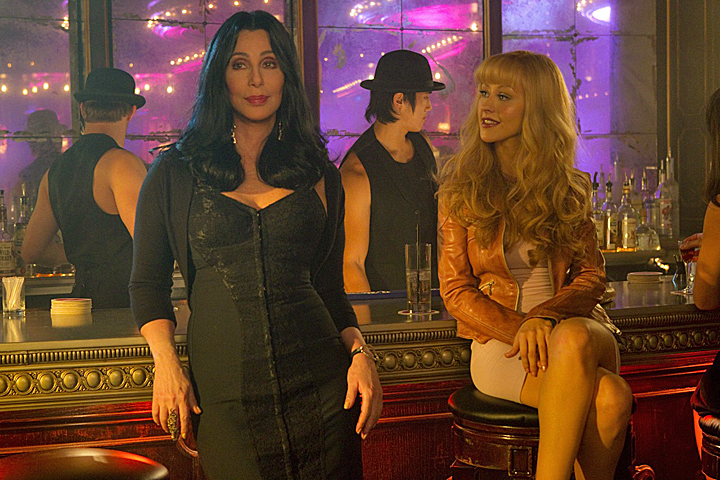Q. You asked if readers raised on color had any thoughts on the B&W issue. I was born in 1971, and the worlds of television and cinema were fully in color. I grew up “hating” black and white, and dismissed it as something that was only used because there was no better option. In my teenage years, I saw two films that used black and white when color was readily available, and it worked exceptionally well: Woody Allen’s “Manhattan,” and David Lynch’s “Eraserhead.” These films convinced me that black and white is beautiful, and can help in the creation of mood and theme (although Lynch might have done “Eraserhead” in B&W for financial reasons).
So, to the reader who wants to expose her children to films that they will enjoy, and wonders if using the color versions will help that process–I say, go for it! If they truly learn to love film the way I did, they will discover that b&w is an option, not a drawback. I would rather a young person watch a colorized old film than not watch it at all, and hopefully someday they will love it enough to see it the way it was intended to be seen. (Scott Mobley, Las Vegas NV)
A. My selection as the Great Movie on Sept. 30 will be “My Man Godfrey,” a b&w masterpiece that on the Criterion DVD is as stunning a b&w movie as I’ve ever seen on video. I go into detail about its beauty.
Q. When I showed my high school English class the Mel Gibson version of “Hamlet” many of the students pointed out that Hamlet and Gertrude (his mother) seemed to be about the same age. Well, Glenn Close is only nine years older than Mel. I was curious if you recall any other instances of this age-tweaking (aside from roles where the characters age drastically over the course of the film). Any “parents” ever younger than their “children” for example? (Jay Williamson, Springfield MO)
A. It is often pointed out that in “The Graduate,” Benjamin (Dustin Hoffman) was only five years younger than Mrs. Robinson (Anne Bancroft).
Q. There have been questions to the Answer Man about why there are so many pimple-free teenagers in movies. I’m thinking there is a simple reason: continuity. Some pimples will last weeks, and others will show up and disappear. Since some movies will spend an entire month shooting a scene taking place on one night, you can’t have an actor’s face breaking out and clearing up in the same stretch of dialogue. It’s much easier to cover someone’s face with makeup every morning than it is to try to match the exact placement of each pimple from the first day of shooting. Zach Stephens,
Shelby Township, Mich.
A. That explains why filmmakers wouldn’t want an actor with acne, but not how they deal with the problem. I was a power user of Clearasil, which merely replaced a red zit with an orange one, but I suppose you’re right, and expert makeup could achieve wonders. Of course, in this digital age, if you can “retouch” a pimple out of a snapshot in iPhoto, Hollywood can do it in a multimillion dollar movie.
Q. I converted to loving b&w later in life. For me, growing up on only color television and movies created a natural prejudice and barrier to b&w (and to older acting styles). When I decided that I wanted to really explore the history of cinema, I knew that I’d have to get used to b&w, so I did. At first I struggled, but now I’ll see six or seven movies and then realize that I haven’t seen anything in color for a bit. It may also have helped to see “Manhattan,” “Raging Bull,” “The Last Picture Show” and “The Man Who Wasn’t There.” These films released me from the burden of getting over two things at once. And all four of those movies are simply wonderful to look at. Nathan Marone, Chicago
A. Agreed. My original question still remains: Why do people immediately say they “don’t like” b&w? Why won’t they accept it as a choice rather than a handicap? Notice that a lot of TV commercials use b&w to make their product seem sleeker, glossier, more mysterious and romantic.
Q. Regarding your answer to Yuri Duncan’s question about the fastest time between the original movie and the remake: I’m not sure this is a record and it may not technically count as a remake, being a movie based on the same source material, but “Dangerous Liaisons” and “Valmont” came out only about a year apart. Chris Dugas, Toronto
A. Duncan’s question inspired at least 20 replies. Here’s a sample: Jeremy D. Schmidt, Prince George, B.C.: If this includes Hollywood remaking a foreign film, then I submit “Infernal Affairs” (2004) to “The Departed” (2007) and “Ju-on: The Grudge” (2003) to “The Grudge” (2004) (the two “Grudges” were by the same director, Takashi Shimizu, no less). Jonathan Pacheco, McKinney, Texas: Does “The Incredible Hulk” qualify? It may not be a “remake” of Ang Lee’s “Hulk,” but I think do-overs should count as well. Daniel Eig, Huntington N.Y.; Graham Powell, Fort Worth, Texas: “The Maltese Falcon” was made three times from 1931-1941. The last one starred Humphrey Bogart and is considered a classic, while the earlier films are all but forgotten. Guy Handelman, Sherman Oaks, Calif.: I’m sorry to remind you that the Disney film “Jungle 2 Jungle” was a remake of the French film “Little Indian, Big City.” If I recall, you named “Little Indian, Big City” the worst film of 1996 and “Jungle 2 Jungle,” the worst film of 1997.
Q. When watching movies with subtitles, I find I miss a lot of the images on the screen. Since movies are primarily a visual medium, we can assume that the director has put a lot of effort into the image appearing onscreen. How do you handle this when viewing movies? Do you have any suggestions other than watching the movie multiple times?
Charles Hart, Raleigh, N.C.
A. As a veteran of thousands of subtitled films, I hardly notice subtitles, unless they’re hard to read. Why distributors don’t always use clear subtitles is beyond me. I prefer subtitles to dubbing, because I would rather hear the actors’ real voices and real performances than listen to a group of dubbers in a sound studio somewhere.
In Europe, however, films are routinely dubbed. In France, for example, new releases always play with subtitles in prestigious theaters, but then roll out nationally in dubbed versions. (The original versions are advertised as “V.O.,” which means “version originale.”) Of course, DVDs have widened our choices by offering the original version and sometimes many different subtitle languages. That’s the case with most Asian martial-arts movies; I remember one with subtitles in six different languages.












